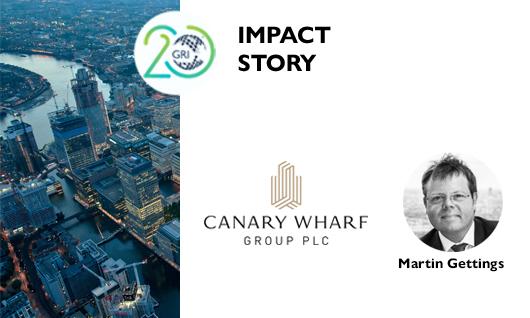Q&A With Canary Wharf: Reporting Helps to Inform, Inspire and Influence Responsible Business

A major property developer in one of the world’s most vibrant cities, Canary Wharf aims to embed sustainability in the heart of its business. The company has included non-financial information in their corporate reports since 1987. We spoke to Martin Gettings, Group Head of Sustainability at Canary Wharf, about how sustainability reporting helps them to tell compelling stories and inspire others.
Martin Gettings: “We use sustainability reporting to keep our stakeholders informed on the actual activity we do as a business – to communicate it loudly and transparently and through this, we aim to inspire our people, peers and partners to come together to make sustainability real."
“Sustainability reporting helps maintain our focus on impacts and impact measurement throughout the year, particularly for those things, which are historically difficult to measure. It also serves as a good benchmark against our peers and other organizations, for us as a business and for our stakeholders.”
How has reporting helped Canary Wharf form its approach to sustainability?
“Sustainability reporting has helped with prioritization and focus on both reporting and action. Assessing our material issues for the purpose of reporting helped us realize that both our own priorities and those of our stakeholders lie within the activities and impacts of our core business. For instance, creating vibrant communities is at the heart of our mission and is fundamental to our stakeholders, making this one of our most material issues.
“For us, sustainability is integrated and engrained within every part of the business, and is central to everything we do. It is not just an additional layer of commitment, it is essential for us to be competitive as a business and to achieve our mission. Therefore, while sustainability reporting has driven us towards more concise and accurate data collection, and reporting in some areas; in other ways it is more about casting what we are doing in a different light. This has helped create a more internal drive towards excellence in reporting.”
Could you tell us a few examples of Canary Wharf’s major sustainability impacts?
“Our positive impact on the community is a considerable one. For example, Canary Wharf Group has helped generate £1.59 billion of business for companies based in East London, and in 2016, over 40 per cent of our purchasing was with local businesses. We are also the first property and construction company, in London, to be a Living Wage employer. In terms of our environmental impacts, we have achieved 100 per cent zero carbon electricity since 2012, and, for the past 8 years, zero waste to landfill from our managed areas. During this period, we also diverted around 40,000 tons of waste from landfills.”
How does sustainability reporting connect with Canary Wharf’s commitment to the UN Sustainable Development Goals?
“It needs to be in absolute alignment. As a business, our sustainability reporting is materiality-driven and our commitment to Sustainable Development Goals is based on our understanding of our sustainability impacts and opportunities. Therefore, the two are very closely connected.”
What is your vision for the future in terms of sustainability and reporting?
“Since our beginnings we have been reluctant to shout about the good work we do, preferring just to get on and do it. But through our on-going corporate responsibility and sustainability reporting we are starting to see the value of telling our story, to inform, inspire and positively influence our audience and interested parties. Our vision for the future of sustainability reporting is that business and citizens merge seamlessly into a single point of responsible activity, fully transparent, accessible, understood, engaged and challenged by all. GRI is helping us all achieve this.”
With the GRI Sustainability Reporting Standards, companies are able to unlock the transformative power of transparency, while contributing to the sustainability agenda and increasing trust. Click here for more impact stories from GRI's network.

